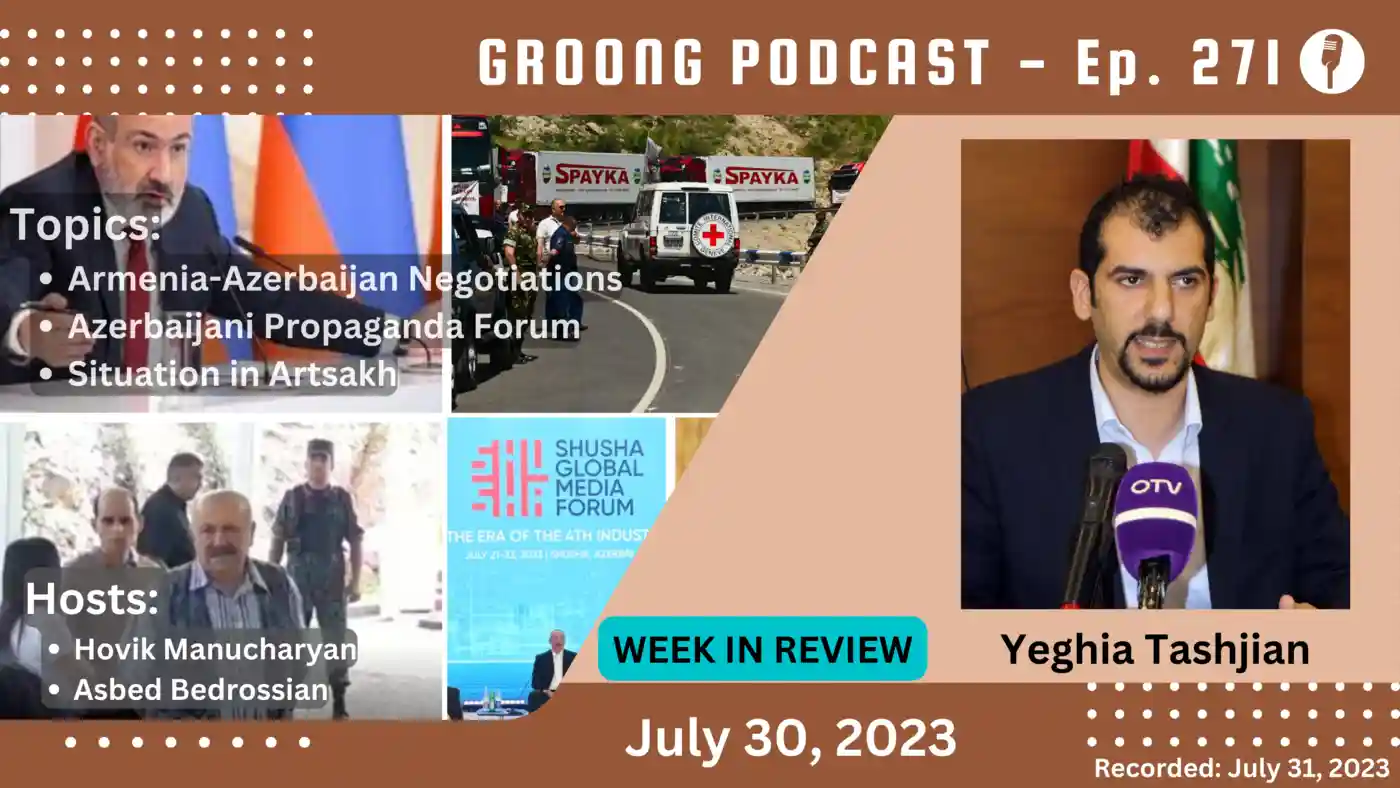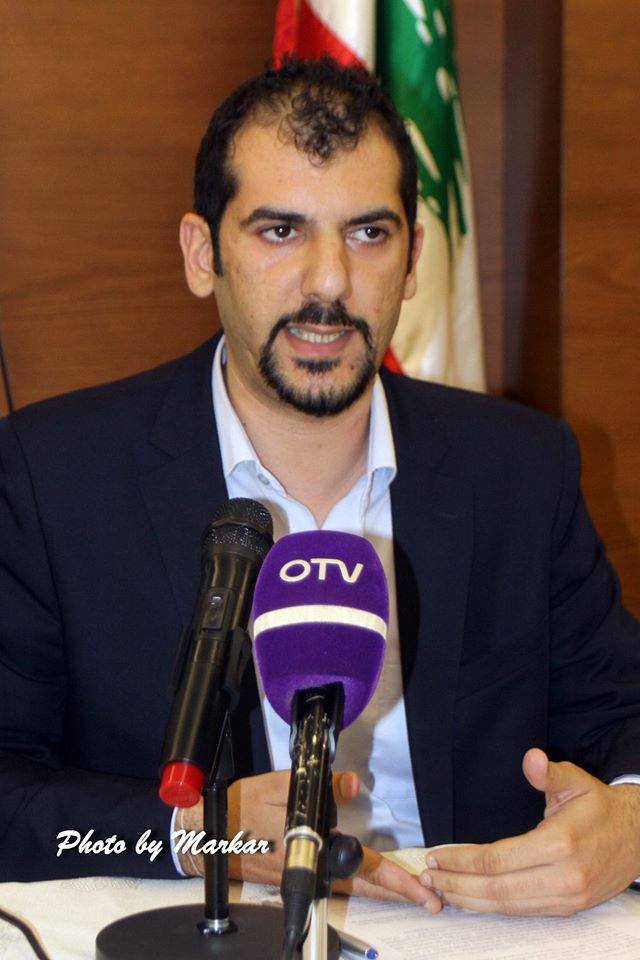
Guest:
Topics:
- Armenian Azerbaijani Negotiations
- Azerbaijani Propaganda in Shushi
- Situation in Artsakh
Episode 271 | Recorded: July 31, 2023
Show Notes
Topics This Week
Armenia Azerbaijan Negotiations
The major news on the negotiations front last week was the meeting between Ararat Mirzoyan and Jeyhun Bairamov that took place under the auspices of mediation by the Russian Foreign Minister Sergey Lavrov.
Russian Priorities
Summarizing the developments, over the course of July the total blockade and isolation of Artsakh has continued, and there is now talk about famine and a pretty dire situation.
All the major (and also not so major) international players have called on Azerbaijan to open the Lachin/Berdzor corridor: the US, the EU, Russia, France, the UK, Austria and so on. To no avail, of course, because Azerbaijan doesn’t need to listen to these calls when, from the other side of their mouths, they tell Azerbaijan that there will be no consequences or repercussions to its actions.
One thing struck me though, was a Russian MFA statement from July 15 that Pashinyan’s recognition of Artsakh as a part of Azerbaijan has “radically changed” the conditions under which the November 2020 trilateral agreement was signed.
Questions:
- What is being negotiated, and what is important to Moscow, especially given this week’s news?
- Is this a radical statement on the part of Russia? Can you help us understand how the Russian MFA is analyzing the existing situation, and unfolding scenarios moving forward?
- How does the war in Ukraine figure in the Russian calculations?
Russian Peacekeepers Post 2025
In the past weeks, there have been statements from Aliyev and Erdogan that Russian peacekeepers should leave Artsakh in 2025. There was a quick rebuttal from Moscow basically saying that the matter was not up to Turkey to decide.
Obviously there is pressure on Russia to exit Artsakh, Armenia, and the South Caucasus. This seems to be the goal of the western-mediated talks between Armenia and Azerbaijan.
Questions:
- Russia responded to Erdogan’s comment swiftly. Have they become irate with Erdogan because of the stance he took in the NATO meeting in Vilnius? Erdogan said he supported admitting Ukraine in NATO, he’s sending MLRS and drone systems to Ukraine to fight against Russia, etc. There are even reports that Turkey is working with Ukraine behind Russia’s back to export grain. What was the cause of Russia’s unusually strong reaction?
- What makes sense for Russia in Artsakh and Armenia? What are the short and long term Russian foreign policy objectives in the region, and how can they best defend them, given Armenia’s current foreign policy? Can Russia find any way to stay in Artsakh post 2025 if the peacekeeping mandate is not extended?
Brussels & Moscow Meetings
Reportedly in Brussels on July 15 there was not a lot of progress, at least none that was announced publicly. The main issues being border demarcation, Lachin Berdzor corridor, so-called “rights & security” for Artsakh, Zangezur corridor, etc.
It seems that with the Pashinyan regime’s approval or at best silence, major international powers are increasingly adopting Azerbaijani talking points and that includes Russia. For instance, in his statement afterwards, Michel noted the option of using Aghdam in parallel to Berdzor which Azerbaijan is blockading. Also, his omission of “international mechanisms” for Baku-Stepanakert dialogue, omitting the word “corridor” in discussing Lachin Bedrzor corridor, and effectively endorsing Aliyev’s recommendation to supply Artsakh with so-called “aid” through Aghdam (bypassing Armenia) all point to the EU increasingly pushing Azerbaijan’s agenda on Armenia and Artsakh, and accepting Azerbaijan’s policy of coercive diplomacy.
Meanwhile, while Pashinyan keeps reiterating his commitment to peace with Azerbaijan, because he said without a peace agreement there will be a new war, Aliyev says he plans to settle 150,000 Azeris in Artsakh, so maybe in a few days we’ll see Michel push that on Artsakh as well.
Questions:
- What’s with Pashinyan’s frequent, repeated commitments to his “era of peace”? What is he communicating with these repeated statements, and to whom?
- Was anything achieved in the Brussels summit?
Last Monday, Mirzoyan and Bayramov met in Moscow. No tangible progress was announced in discussions of the “rights & security of minorities in Azerbaijan and Armenia’’. This seems to be putting an equal sign between the rights of refugees in Artsakh (such as from Hadrut and Shushi) which are explicitly mentioned in the Nov. 9-10 statement and rights of refugees from the 1990s.
This statement led to rumors that Pashinyan’s government is discussing the settling of Azeris in Armenia by the tens of thousands. The ANCA has also in the past rung alarm bells that USAID is ready to support Aliyev’s campaign to settle Armenia with Azerbaijanis.
Armenian officials denied these rumors, and a deputy FM also stated that Azerbaijan may be throwing up hurdles in the negotiations, because they have designs on Armenian territory, and they don’t want to accept the 1991 borders.
Questions:
- What are the prospects for Armenia and Artsakh through these ongoing negotiations?
- At this point in time what does Russia have to offer, or hope to achieve through these Moscow meetings?
Azerbaijani Propaganda and Lobbying
As the critical situation in Artsakh becomes even more dire, this weekend Aliyev seems to have pulled off another feat in international propaganda. He was able to invite a group of 250 journalists representing nearly 50 media outlets to Shushi for a so-called “media forum”.
Some attendees reported that all their expenses were covered. While many of the attendees were bloggers or social media influencers, the meeting unfortunately did include some big name organizations, legitimizing the oppression going on just a few kms away from them.
Pro-Azerbaijani Russian journalist Igor Korotchenko was there too and received special applause and thanks from Aliyev.
Questions:
- Was coverage of the event picked up by Russian media?
- We’ve frequently talked about the fact that Aliyev is able to buy the favors of Russian media and think tanks. How serious is this problem? And what is the trajectory? What is the solution?
- The Russian Armenian community has traditionally been reasonably influential, but most recently the Azeris appear to have gained significant advantage and are using it to advance their political interests. Is this a function of the Armenian community becoming more inert? Or the Azeris becoming more activated? Or is it a function of the geopolitics of the South Caucasus leading the local politics in Moscow?
Situation in Artsakh
Humanitarian Aid Convoy
As the situation in Artsakh deteriorates, this week a special committee that was created by Pashinyan for the purpose of aiding Artsakh back in December was revived. The committee, chaired by a deputy PM, announced that a humanitarian aid convoy carrying 400 tons of aid would be sent to Artsakh.
Ceremoniously, the convoy of trucks was publicized starting their route near the center of Yerevan. There was a large PR effort associated with the cargo, announcing the cargo passing through various waypoints as it traveled to Kornidzor. Special Ambassador at large Edmon Marukyan and Deputy Foreign Minister Vahan Kostanyan were at hand and the latter escorted staff of foreign embassies stationed in Yerevan to the Kornidzor area.
The only problem is that the cargo stopped right on the border near Kornidzor and hasn’t moved an inch for five days. The Azerbaijanis announced that the truck convoy would be seen as a provocation. Even the embassies appeared to know something was up and sent only deputy-level officials. Not a single head of mission appears to have been part of the group. The US, for instance, sent the head of USAID in Armenia as part of the delegation.
Question:
- What was Yerevan’s goal in organizing this media and PR stunt about sending aid, if it appears that it hadn’t received agreement ahead of time that the aid would be allowed to go through?
A Checkpoint For Kidnappings and Abductions
Not only has Azerbaijan been persistently blocking any supplies via Kornidzor to Artsakh, but on Saturday, they abducted an 68 year old elderly Armenian under false pretenses of participating in crimes during the first war. What is even more egregious is that the individual, Vagif Khachaturyan, was part of a group of people in need of complex medical care, being escorted by ICRC.
Critic of the government Edgar Ghazaryan says that this means nobody who fought in any of the wars, even those that were drafted and even women who may have served government posts in Artsakh would be immune. This would essentially be true even if people decided to use Aghdam for passing through.
Question:
- Where is this all heading? Is there a way out of this situation?
HayaQve
This week, the citizen’s initiative Hayaqve, has reached a critical goal, weeks ahead of the deadline:
As of July 29, 54,800 citizens signed the petition:
- 24,660 in Yerevan
- 29,380 in regions
- 760 electronically
The petition is still open for joining, in order to ensure there is enough buffer to account invalid signatures.
Question:
- Can you vote on this initiative if you’re a citizen living abroad’? How?
Find out more at:
Topics from the Panelists
- Hovik: Last respects to Lt. Col Ara Mkhitaryan
- Yeghia: Lebanon’s Central Bank Head Gone
Wrap-up
We hope you found our Week in Review helpful. We invite your feedback and your suggestions, you can find us on most social media and podcast platforms. Thanks to Laura Osborn for the music on our podcasts.
Guests

Yeghia Tashjian
Yeghia Tashjian is an regional analyst and researcher based in Beirut, with expertise in China’s geopolitical and energy security interests in Iran and the Persian Gulf. Currently he is an instructor in International Affairs at the American University of Science and Technology and International and Regional Affairs Cluster Coordinator at the Issam Fares Institute for Public Policy and International Affairs at the American University of Beirut.
Hosts

Hovik Manucharyan
Hovik Manucharyan is an information security engineer who moved from Seattle to Armenia in 2022. He co-founded the ANN/Groong podcast in 2020 and has been a contributor to Groong News since the late 1990s.
Disclaimer: The views expressed by Hovik Manucharyan on the ANN/Groong podcast are his own and do not necessarily reflect the opinions of his employer or any other organization.

Asbed Bedrossian
Asbed Bedrossian is an IT professional, and for years oversaw the central IT enterprise infrastructure and services at USC. His decades of experience spanned across IT strategy, enterprise architecture, infrastructure, cybersecurity, enterprise applications, data center operations, high performance computing, ITSM, ITPM, and more.
Asbed founded the Armenian News Network Groong circa 1989/1990, and co-founded the ANN/Groong podcast in 2020.